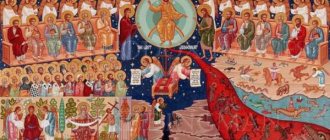Why does God have the right to kill, but man, being the image of God, has no right?
God, being All-Good and All-Wise, always acts from good motives. His actions towards people are always measured against moral benefit. Here we should be amazed not at His severity, but at His long-suffering.
God is sometimes forced to act like a surgeon - to amputate the infected place so that the infection does not go further.
As for a person who kills against the will of God, taking the life of his neighbor, he takes away what does not belong to him. In some cases, murders deprive those killed of the opportunity to repent and perform good deeds in the future, which may affect their fate in the afterlife.
If we own a hotel, the residents of one of the rooms of which behave inappropriately, then don’t we have the right to evict them so as not to make the life of their neighbors hell?
How to explain the presence of evil and cruelty in the world if God is absolutely good?
Okay, you say, but how can we explain the presence of so much evil and cruelty in this world if God is absolutely good? And how does this even fit with the fact that God is completely good? In fact, we need to understand two important things:
- The first is where did evil and sin come from, and who is its cause?
- The second is God’s attitude towards him.
Evil and sin became possible due to the fact that God endowed his creations with free will and at least some of them used free will for evil, i.e. went against the will of God. God is not the cause of evil and sin. Evil and sin are produced by those creations of God who have not used their free will correctly. Who violated the commandments and commandments of God. This is the source of evil in this world! From the Bible we know that the very first to go against God was a great and strong spirit, the angel Lucifer, who carried away up to a third of the angels with him, committing a rebellion in heaven. According to the Bible, this fallen angel tempted the first people on earth, and they fell into sin, their very nature changed, they became corrupt and sinful. And all the descendants of these people inherited this sinful nature. Therefore, all people are sinners. They inherit original sin.
As we know, God is good, absolutely good. This means that God is absolutely fair. And the fact that God is absolutely just means that He must absolutely punish evil and sin. For justice requires the punishment of evil. And absolute justice requires absolute punishment for any evil and any sin. This can be illustrated with an analogue of a mathematical formula.
Punishment = justice * sin, where God’s justice is ∞, respectively, punishment = 0, provided that sin = 0. But if sin is at least a little more than zero, then the punishment is also ∞. That is why everyone whose sin is not zero deserves eternal punishment! And these are all the people on earth!
God is not only just, but also loving and merciful
But God is not only absolutely just, but also absolutely loving and merciful. Therefore, He, realizing that it is impossible for sinners to cleanse themselves from sin and avoid eternal punishment, He Himself goes to meet them and takes eternal punishment for all the sin of all people upon Himself. God's Son Jesus Christ suffered once for all people, taking upon Himself all the eternal punishment for sin. And being an infinite God, He only had to suffer once and not for all eternity.
Therefore, if we want to get rid of eternal punishment, we must repent and accept the sacrifice of Jesus Christ for ourselves. But the sacrifice of Christ does not save our flesh from the consequences of sin; in fairness it must suffer and die. It's different for everyone. But everyone must get sick and die. For such is the just retribution for sin. And since all people inherit a sinful nature, i.e. original sin, then even children who have not yet been born are sinners, and therefore can get sick and die. And this will be fair, for God’s justice is absolute. But this does not mean at all that they will go to eternal torment; no, Christ’s sacrifice, of course, was for them.
At least several tens of billions of people have died due to God's curse.
Some even tried to calculate how many people God killed according to the Bible, and counted something like two million (as in the picture for the article). Fools, you don't know how to count at all! For Adam’s sin, God cursed man with illness and death; by the way, natural disasters: earthquakes, hurricanes, tsunamis, floods, etc., are also the result of God cursing man: “cursed is the earth because of you” (Gen. 3:17). So, in fact, if we count all the natural deaths of people from disease or simply from old age, as well as as a result of natural disasters, then this is at least 4/5 of all human deaths, the rest are people killing each other. And if you count the entire history of mankind, you get at least several tens of billions of deaths! And we are not yet talking about animals, and no one counted how many of them were sacrificed during the Old Testament.
The cruelty of God also includes fatal and painful illnesses of children, as well as ordinary people. What are the costs of cancer? How much torment and suffering they bring! And this is also the result of God’s curse. We must be clearly aware of this.
And if God is cruel, then what does that mean? After all, if we decide that God is cruel, then it turns out that God is sinful, for cruelty is a sin . But God cannot be a sinner. God is the Absolute. Therefore, absolutely good and absolutely holy. If we decide that He is sinful, then He will no longer be absolutely good and holy, and will not be God, since He will not be an absolute. And then atheists and atheists will rejoice: “You see, an absolutely good God could not create such a cruel world! There is no God!” - they will say. How can such cruelty of this world be combined with an absolutely good God? Maybe there really is no God?
The atheists' argument about the cruelty of the world versus the existence of God is pure stupidity
And what have we come to? And to the fact that the very ability to objectively distinguish between good and evil, as well as the awareness that this cruel world does not indicate the absence of God, but, on the contrary, His existence! And the argument of atheists about the cruelty of the world against the existence of God is pure stupidity! For if they deny the objectivity of morality, then how can they even talk about someone’s cruelty? This is simply absurd! Without the objectivity of the moral law, it is simply impossible to make such a judgment! And if they want to judge God with an objective moral law, then they must admit that God exists, for only an absolutely good supreme Reason could create such a moral law! Atheism is actually a very stupid and primitive doctrine that does not notice the obvious absurdities in its arguments against God.
How do non-Christians view the existence of evil?
Photo: Flickr.com
A worldview that is far from Christian has several explanations for the existence of evil:
- the hopeless, which says that since it is so, it cannot be otherwise;
- hoping that with the development of progress, times will come without misfortunes, illnesses and wars, in which humanity will learn the secrets of immortality and improvement;
- fatalistic, suggesting two possibilities - either to follow voluntarily what directs along a certain path, or to be forcibly dragged along a rope along the same path if you do not agree to go of your own free will. Such is fate.
Why is killing a person by a person a sin?
One of God's commandments is thou shalt not kill.
The verb used in it “רְצָח” “to kill” denotes immoral premeditated murder, as opposed to any killing in general as a result of an accident, in self-defense, during war or by a court decision (similarly in English - kill - any murder and murder - illegal). Since the Bible itself prescribes the death penalty by court order (in over 30 cases), this verb cannot mean murder at all, under any circumstances. Those. the watershed is the motive for the murder, its goal.
That. By the sixth commandment, God forbids taking the lives of other people, guided by personal motives for evil or selfish intent, and killing oneself out of despair.
How do we know what is cruel and not cruel?
Stop, let's think logically! How do we know what is cruel and not cruel? How can we objectively judge someone's cruelty? We can judge only if there is an objective moral law on the basis of which we can say: “this is cruel, and that is not.” Otherwise, there can be no question of any objective assessment of cruelty or mercy! But if there is such a moral law of nature, then it turns out that there is also a Supreme Almighty Reason that invented it, for only the Almighty Reason can invent the laws of nature. And this Reason must be absolutely good, because on the basis of what we just tried to judge the cruelty of God, on the basis of some objective law of morality, which must come from some absolute good. And good cannot exist on its own. Good is always a good person, and absolute good - it turns out that there is an absolutely good Person, i.e. God Himself.
As far as we can judge, did the destruction of the pagan tribes produce the expected results?
If it had not been given, then Christianity would not have become a world religion, but would have remained the lot of one people. During the Old Testament, God's providence was aimed at preparing humanity for the Coming of the Savior. Humanism was unknown to the primitive pagan tribes, but by the time of the Coming of the Messiah the situation in the world had changed. As you know, the Church of the first centuries grew with many (former) pagans.
People who criticize the Bible often fall into contradiction - first they see atrocities (the same human sacrifices) and are indignant “how did the Lord allow this!” Then, when they read about stopping evil in the bud, they are again indignant: “How cruelly they treated the poor Canaanites!”
The cruelty of the Old Testament towards the inhabitants of Canaan, which was conquered by the Jews, of course, seems terrifying. But the very fact that such an impression is created among a wide readership indicates that the extreme measure of influence on dehumanized peoples had its effect. Indeed, for many Old Testament people, wars and murders were considered the norm, taken for granted.
Did the concept of personal responsibility exist at that time?
The concept of individual moral responsibility was common even to the first man, Adam. Moreover, both Adam himself and his wife, Eve, experienced the bitterness of responsibility for sin.
During the time of Moses, the concept of personal responsibility was written into the Law of Sinai. As for the representatives of the pagan tribes who then inhabited Palestine, the idea of personal moral responsibility was often overshadowed by the ideas of collective, tribal. The man vividly felt like a member of the community. In his moral (immoral) actions and deeds, he tried not to go beyond the general tribal norms of behavior and morality. Many sins practiced within certain tribes were not private, but widespread. Therefore, the curse that fell on the Canaanites, in view of their monstrous atrocities, fell on entire tribes (note that the pagan codes themselves implied the appropriateness of collective responsibility; for example, the Babylonian Code of Hammurabi prescribes: if the builder built a house so poorly that it collapsed and was buried under the rubble the customer’s family, then it should be killed – not the builder, but his family).











